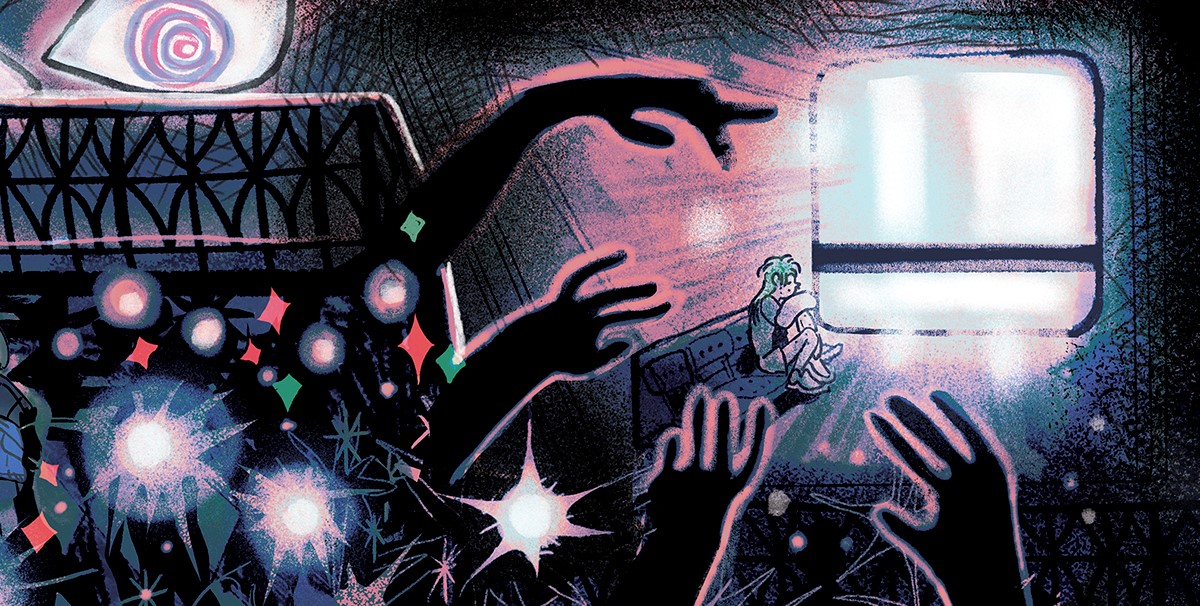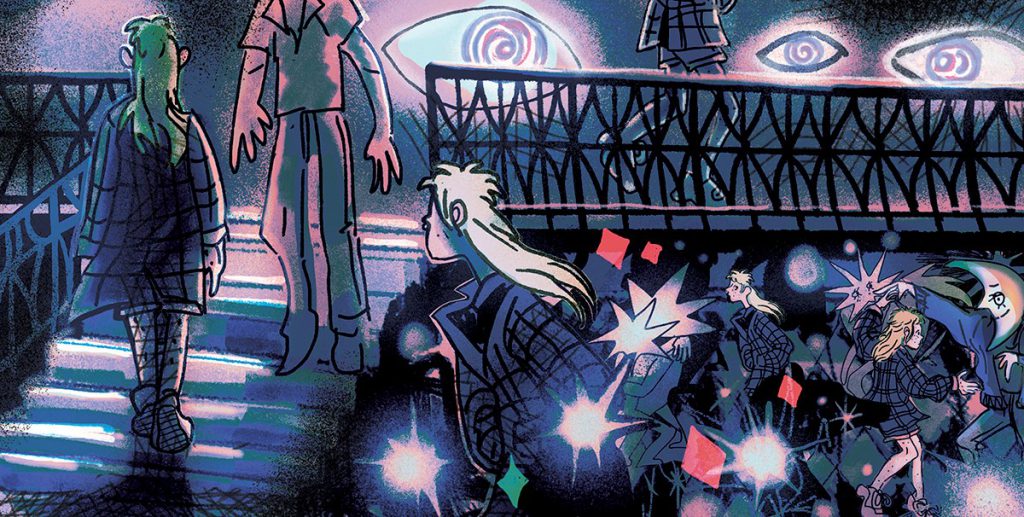Last summer, student organisations concluded a pact against sexual violence under the auspices of government commissioner for sexually transgressive behaviour and sexual violence Mariëtte Hamer. “It is a first step towards a change in culture in which we learn to recognise each other’s boundaries, correct our behaviour and offer our apologies”, writes Hamer in the foreword.
There is still much to be done, because recent research shows that two out of three students experience sexually transgressive behaviour during their period of study. Shortly after the signing of the student pact, the student association L.A.N.X. attracted negative headlines related to sexually transgressive behaviour in the initiation ritual for one of its fraternities (one of the tasks was to ‘arrange sex with a refugee’). A survey by Ad Valvas (VU Amsterdam’s newspaper) on Instagram yielded many responses from VU Amsterdam students who had experienced transgressive behaviour. Of the nearly 400 respondents, 27 percent said they had experienced sexual violence, while a further 16 percent said they weren’t sure.
How can that be? Why is this behaviour so persistent? Why is it apparently proving impossible to root out the sexism that underlies it, even after six years of discussion prompted by the #MeToo movement, even among critical young people following an academic course of study?
Cultural change takes time
“It’s not just a problem among students”, points out Linde van Mechelen, president of the National Chamber of Associations, the umbrella organisation for all Dutch student associations and one of the people behind the Student Pact. “It is a society-wide problem which, while it has been in the news a lot in recent years, won’t be solved in a day. A cultural change is needed and that will take a lot of time.”
Her words are echoed by Willy van Berlo, programme manager for sexual violence at Rutgers, the Netherlands’ expertise centre for sexuality and sexual health. “The culture is tenacious and for an association like L.A.N.X. we are talking about traditions that are held very dear, even where it is clear that they are totally unacceptable. Traditions can be fun and valuable, but not if they serve to maintain a culture that is damaging.”
Unplanned pregnancies and STDs
If we want that to change, we need to start young, says Van Berlo. “We want to see good sex education in primary and secondary schools, not just about the birds and the bees but also about respecting each other’s wishes and boundaries. That kind of education is still far from universal. Often it remains limited to reproduction and how to prevent unplanned pregnancies and STDs. The part about respect, stereotyped gender norms and consent is really very important.”
For students and other young people, Rutgers has set up the ‘Are you okay’ campaign. “It helps make young people aware of what sexually transgressive behaviour is. It’s about young people pulling together to make sure everyone has a good time and knowing that there is no place for transgressive behaviour. So you ask: ‘Are you okay?’ if you see something happening to someone that doesn’t seem right to you. That way we hope to contribute to changing the culture.”
Whether sexually transgressive behaviour has lessened since MeToo, Van Berlo cannot say. “Recent studies, for example by Amnesty International, reveal high figures among students, but I do think there is more awareness. It’s still a big problem, but it is being taken more seriously.”

One beer too many
Ad Valvas approached a number of student organisations, but found that they were not especially keen to talk about sexual violence. The committee of one of the biggest student associations on the VU campus, Aureus, of the School of Business and Economics, did respond. Committee members Marit Nieuwenhuizen and Jim de Boer said they knew nothing about the Student Pact (“Perhaps it got sent to an e-mail address we no longer use”) but that they are taking measures to make sure “everyone feels good, safe and welcome”.
They have both already completed their Bachelor’s in Business Administration but, de Boer says: “For the first two years of our programme we were in lockdown and we only saw each other on our computer screens. We had little or no contact with fellow students, which meant we did not encounter transgressive behaviour.” In the third year, nothing of that kind happened at Aureus, at any rate. “If someone who has had one beer too many starts saying things that aren’t acceptable, he will be taken to task for it right away”, observes De Boer. In any event, at the drinks events and excursions organised by Aureus, they keep a close eye on the alcohol consumption of the members.
Not walking home alone
“We have a number of standard measures to make sure everyone stays safe”, says Nieuwenhuizen. “During big events, there are always a few designated committee members who won’t be drinking. Plus the association has two confidential counsellors to make sure sensitive issues can be discussed in a safe environment. And when students come to us with problems, we talk to them and, if necessary, refer them to the right place to get help – for example, a student psychologist.”
To date, Nieuwenhuizen has not spoken to any Aureus members about transgressive behaviour. “We know that there are students who sometimes feel lonely”, says Nieuwenhuizen. “If we see someone standing by themselves looking a bit lost at a drinks evening, we’ll go and talk to them, to make them feel more welcome and at ease”, explains De Boer.
De Boer does have some experience with regard to sexually transgressive behaviour, but never in student life. Nieuwenhuizen feels safe on the street in the evening, but reveals that she never walks home alone. Her father will cycle with her, or her boyfriend takes her home. She never goes to the gym alone either.
#Zouikwatzeggen app
For the past year, the SRVU Student Union and the University Student Council have been lobbying for an app, ‘#Zouikwatzeggen’, that would make it easy for VU Amsterdam students to report transgressive behaviour. “The medical faculty has had the app since 2019 and they are very satisfied with it”, says SRVU chair Sylke van Kempen. “The app already exists and we have included it in our improvement plan for VU Amsterdam, complete with proposals for the organisation, a development plan and funding – we have done all the legwork. It is very frustrating that the university does not want to engage with it.”
Marlies Eijsink, communication adviser for the medical faculty, confirms that the app has been a success. “These days, every organisation has a complaints procedure for transgressive behaviour, but it will often only provide a general e-mail address, so it is unclear who your e-mail will end up with. With the app, you can report incidents anonymously if you wish, even if you don’t necessarily want to submit an official report but want to talk about your experience with a fellow student.”

Anonymous reports
With a step-by-step procedure, the app helps people by establishing exactly what happened to them, what they can do about it and who they can approach. The app has 40,000 users, because apart from VU Amsterdam’s medical faculty, the medical faculty of the University of Amsterdam, Amsterdam UMC, Erasmus MC and the Albert Schweitzer hospital have all signed up to use it. “It is important to realise that the app is not the solution in itself”, points out Eijsink. “The app needs to be embedded within a complete programme, including training in awareness and assertiveness, to make the working environment safer.”
“Aside from the fact that we consider the app #Zouikwatzeggen to be a fine and accessible initiative to raise the issue of transgressive behaviour for discussion, we also see a number of challenges, such as the ability to report transgressive behaviour anonymously”, responded the executive board of VU Amsterdam. “No action can be taken in response to an anonymous report, which means we cannot help that person. In addition, there is no mechanism for both sides to be heard. And research shows that most reports of inappropriate conduct are received through conversations with a confidential counsellor or academic advisor. For this reason, we have chosen to focus our policy on personal contact.”
Clumsy chat-up attempt
There is plenty of behaviour that everyone understands is completely unacceptable. You don’t send out students to arrange sex with a refugee. But there is also a grey area: “What to one person may seem like a funny remark can be seen by another as crossing the line”, says SRVU chair Van Kempen. “Every group has different norms and values – to some extent it depends on the bubble you are in. We could also be talking about a clumsy chat-up attempt.”
“Sometimes, when alcohol is involved, situations can suddenly get very uncomfortable”, says Bart Verkerk, International Business Administration student and member of the SRVU committee. “For instance, one time a woman came over and sat on my lap, with no ulterior motive, just to be friendly, you know? But someone else started making suggestive comments and I suddenly started to feel uncomfortable. I wouldn’t necessarily say those comments were transgressive, but I don’t think they were okay either.”
Grey area
The Student Pact also addresses this. “Student organisations say they encounter various problems imposing measures when it comes to sexually transgressive behaviour, especially in situations that fall into the ‘grey area'”, the authors note. “At least talk about it”, says Van Kempen. “That way, people are made aware that they may be making others feel unsafe, even if that was never their intention.”
Not many cases of sexually transgressive behaviour are known to the SRVU on campus, but students have reported incidents outside – at home or in cafes, at their student associations, student residences or sports clubs, says Van Kempen. “Opportunities for VU Amsterdam to intervene in such cases are limited. Students can go and see a student psychologist, and VU Amsterdam can help them to find the right help.”

Bum touching
“There are bound to be situations that could perhaps be regarded as transgressive but that are not always experienced as such, such as being wolf-whistled or having your bum touched in a club. They’d better not do it to me and it will never have the effect they are hoping for, but I’m not sure if I would call it sexually transgressive. I would be more inclined to use that label for something that has a serious emotional impact on a person. Things like wolf-whistling don’t have that impact on me. But of course others might see that as transgressive due to previous unpleasant experiences, trauma or simply because they have different boundaries. As they are entitled to do. No one should be made to feel unsafe by another person.”
Respondent to the Instagram survey
Hands in trousers
“A number of years ago, I was inappropriately touched by a fellow member during an introductory weekend held by my student association, an association for LGBTI students. He put his hands in my trousers. First from behind, then, after I told him to stop, from the front. I walked away, but I was still very young and I felt really confused by it. I felt shame, I wondered whether this was just what you had to expect, and it made me reticent about flirting and stuff for a long time afterwards. Only years later did I talk about it with the committee of the association. It was a real shock to them. You don’t expect something like that to happen to you there of all places.”
Bart Verkerk (22), third-year International Business Administration
Pushy yoga teacher
“One time the yoga class at the VU Sports Centre was led by a substitute, a VU Amsterdam student, who approached me afterwards and pressed me to exchange contact details with him. Afterwards, I got messages from him that I felt were way out of line, with a sexual undertone. I let him know I didn’t appreciate them, but he paid no attention. It made me feel insecure and objectified. My mental health really took a knock as a result.
I complained to the VU Sports Centre by email, but ten days later I had still not received a reply. Only after a second e-mail did the Sports Centre respond that he was a substitute teacher and that it was unlikely I would encounter him again. I found that disappointing and as a result, the Sports Centre is no longer really an option for me. I’m finding it really hard to get back into a good exercise routine, even at a gym outside the university.”
Respondent to the Instagram survey
Response from Jolanda Seijger of the VU Sports Centre: “It is absolutely not appropriate for an instructor to ask people for their contact details and we impress upon all of our instructors the importance of keeping their relationships with participants to their classes purely professional. We have therefore raised the issue of his conduct with the instructor in question.”
